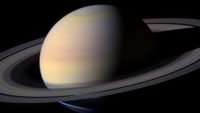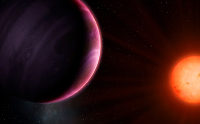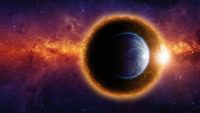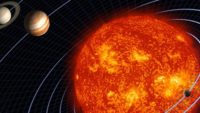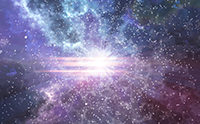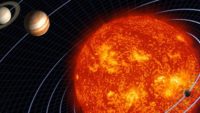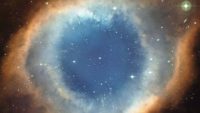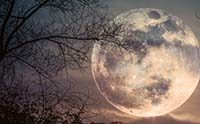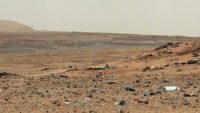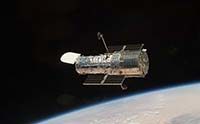By Jeanette Littleton The $3.26 billion Cassini-Huygens mission, launched in 1997, was a resounding success. It vastly improved our understanding of Saturn. The space probe Cassini’s most amazing discovery didn’t make the headlines: the clear testimony to Saturn’s young age and the fact that it had a Creator. …read more Source: AIG Daily
By Dr. Stefan Parfitt A novel satellite is scheduled to investigate the feasibility of using “solar wind” as a source of propulsion for spacecraft and satellites by using solar sails. If successful, solar sails may eventually prove suitable for propelling long, unmanned space exploration and possibly manned, interplanetary operations. …read more Source: AIG Daily
By Troy Lacey In a recent paper published in the Astrophysical Journal Letters, a team of Chinese and Japanese astronomers reported on high-Lithium concentrations in 12 newly discovered low-mass, metal-poor, main-sequence and Red giant stars in the Milky Way halo. …read more Source: AIG Daily
Does astronomy disprove the Bible like many scoffers claim? Actually, history confirms that the Bible is always right when it touches on any subject—including astronomy. Learn how the Bible got astronomy right when it addresses the roundness of Earth, its suspension in space, the expansion of the heavens, and more! Listen: Astronomy: The Bible Got It Right! | The Institute for Creation Research
Evolutionists continue to wrestle with just how our nearest lunar neighbour was formed … and their explanations are unsatisfactory. …read more Source: creation.com
Data obtained by an instrument aboard the Cassini space probe have convinced planetary scientists that Saturn’s rings can be no more than a few hundred million years old.1 These new data confirmed some researchers’ previous suspicions. For instance, a previous ICR news article described how numerous planetary features within our solar system—including Saturn’s brilliant rings—look “young,” even to secular scientists.2 One of these features is the cleanness of Saturn’s rings. Secular scientists claim that the solar system is around 4.5 billion years old, so if Saturn’s rings were indeed that old, then they should have experienced billions of years’ [More]
Space probe Rosetta finds oxygen gas found in coma of comet 67P/Churyumov–;Gerasimenko …read more Source: creation.com
By Troy Lacey Take a look at some of these astronomy/astrophysics-related news stories from the cosmic-evolutionary view and see how some have been paradigm changers. …read more Source: AIG Daily
We are all space travelers-and Spacecraft Earth helps us understand our place in God’s universe. …read more Source: creation.com
By Dr. Danny R. Faulkner One of the major proponents of using the big bang to prove God’s existence is the Christian philosopher William Lane Craig. …read more Source: AIG Daily
Secular astronomers recently described three bizarre discoveries that challenge mainstream ideas of an evolving universe: a planet that’s too big for its star, a distant “young” galaxy that shouldn’t look old, and an explosion that should have happened a long, long time ago. More… …read more Source: icr.org
By Dr. Danny R. Faulkner Promoters of Nibiru‘s existence often call it “Planet X,” and use articles and astronomers’ comments about Planet X to support their claims about Nibiru. …read more Source: AIG Daily
By Dr. Danny R. Faulkner While we creationists may not have explicitly predicted such a thing, the discovery of 1I ‘Oumuamua is consistent with what we know about creation. …read more Source: AIG Daily
Recently, the asymmetry matter/antimatter problem, one of the most serious objections to the Big Bang model, just got a little worse. More… …read more Source: icr.org
Most evolutionary astronomers talk about the Oort cloud like it’s a fact. Yet they admit no direct observational evidence exists. Shop Now When I was growing up, the definition of science was simple: “the study of the natural world using the five senses.” This definition placed some limits upon science. For instance, science was restricted to the study of the natural world, so anything supernatural was out of bounds to science. Supernatural things include miracles, angels, souls, and God. Even if something is part of the natural world, it wasn’t considered scientific unless we could detect it with our [More]
On October 16, 2017, two press conferences generated much interest when they announced the detection of two neutron stars merging. What particularly caught the public’s attention was the claim that this event produced perhaps 10 times the earth’s mass in gold. How much of this story is established fact and what parts are conjectures? And what does this mean? Let me sort through this. Read More: Spinning Stardust into Gold | Answers in Genesis
By Dr. Danny R. Faulkner With yet another set of failed predictions, shouldn’t all this nonsense about Nibiru finally go away? It should, but it probably won’t. …read more Source: AIG Daily
By Dr. Danny R. Faulkner The best stellar evolution models fix HD 140283’s age to slightly older than the big bang model age for the universe. …read more Source: AIG Daily
By Dr. Danny R. Faulkner The winter solstice has a special effect at Ireland’s most famous megalith. …read more Source: AIG Daily
By Jonathan Bartlett After examining the present and future state of cosmology, Krauss and Scherrer conclude that we live in a very special time in the universe. …read more Source: AIG Daily
By Dr. Danny R. Faulkner The belief that there will be a literal fulfillment of the Revelation 12:1–2 sign on September 23, 2017, depends upon there being nine stars in Leo. …read more Source: AIG Daily
By Dr. Andrew A. Snelling Meteorites have an amazing story to tell, but it has been misunderstood. …read more Source: AIG Daily
Physicists conduct real, evidence-based research but astrophysicists can only deal in hypotheses. …read more Source: creation.com
In stark contrast to Genesis 1, secular scientists claim that a collision between a planet-sized rocky object and an ancient Earth somehow crafted the moon billions of years ago. This supposed collision was so violent and hot that it would have burned off all the original moon water—assuming there was any. So why do researchers keep finding evidence of water inside the moon? More… …read more Source: icr.org
By Ken Ham When you think of idyllic places to live, the dusty surface of Mars probably doesn’t come to mind. Over the years, some scientists have discussed the possibility of colonizing this planet. The Red Planet, while beautiful in its own way, certainly doesn’t have a welcome mat out, inviting life to come and thrive. Well, according to a new study, the surface of Mars is even more uninhabitable than previously thought. Perchlorates, salt minerals found on the surface of Mars, kill bacterial life within minutes. These compounds are stable at room temperature and were thought to become active [More]
The Hubble Space Telescope recently discovered a distant “dead” galaxy, but it produces a puzzle for nature-only origins ideas. More… …read more Source: icr.org
By Ken Ham Well, it seems scientists have done it. They’ve discovered an ingredient needed for the evolution of life around distant stars! Now all they need is a planet just the right distance from just the right star with just the right environment (and of course all the rest of the ingredients for life, including an information and language system)—and then they’ll have life! Of course, I write this tongue in cheek. Scientists are no closer to discovering a naturalistic mechanism for the origin of life (here on earth or elsewhere in the cosmos) than they were before this [More]





















